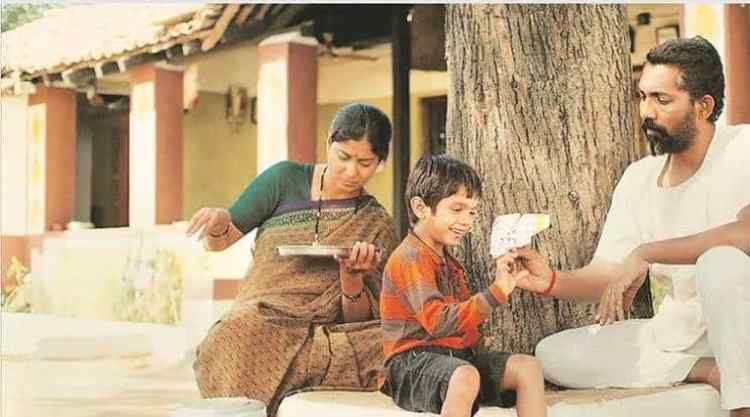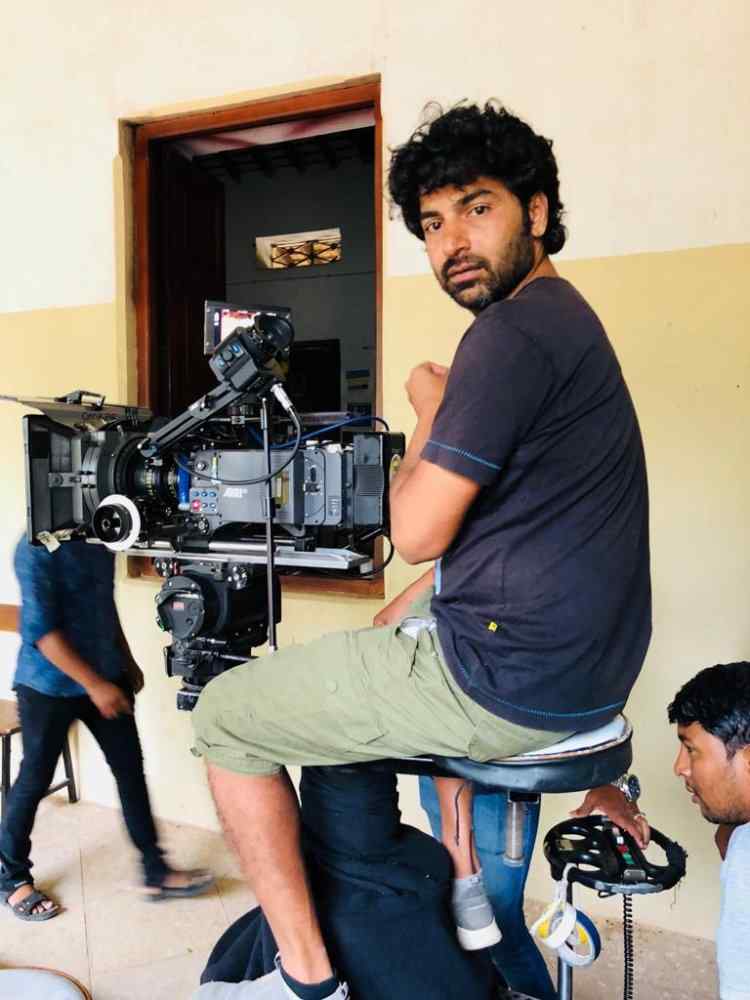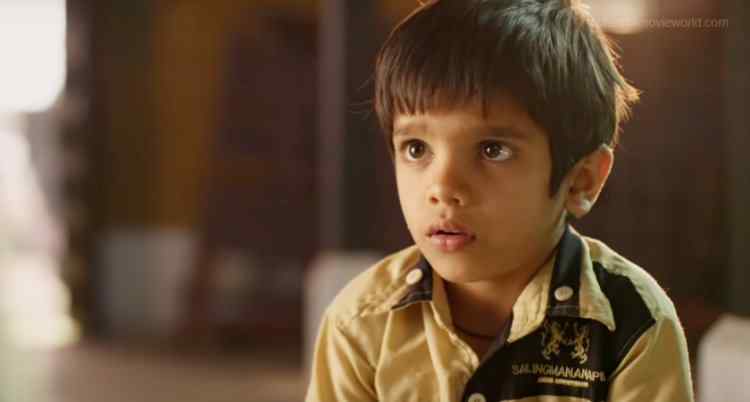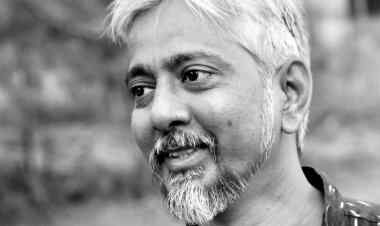Film Review: NAAL – THE UMBILICAL CORD
Dr. Shoma A. Chatterji writes, " The word “naal” in the Marathi language means “umbilical cord,” or, to put it simply, ‘bonding.’ It is the title of a Marathi language film which bagged for its director, Sudhakar Reddy Yakkanti the National Award for the Best Debut Director at the 66th National Awards in 2019 "

Veteran Indian film scholar and author, Dr. Shoma A. Chatterji writes, “The director establishes the ambience from the opening shot with a feather-like flower floating in the breeze to finally land in the waters of a river where the little Chaitya is merrily having his bath along with other boys.”
The word “naal” in the Marathi language means “umbilical cord,” or, to put it simply, ‘bonding.’ It is the title of a Marathi language film which bagged for its director, Sudhakar Reddy Yakkanti the National Award for the Best Debut Director at the 66th National Awards in 2019 and also, the National Award for the Best Child Artist to Shrinivas Pokale who performed the role of the little protagonist Chaitanya in the film.
It is one of the most beautiful films I have had the opportunity to watch in recent times. The director, who switched over from cinematography to direct his first film, has made a film in which we see the world, the relationships between a little boy and his mother, his friends, his school and so on, entirely from the point of view of the boy, Chaitanya. Sudhakar has also worked as screenwriter, editor and producer known for his works in Hindi, Telugu, and Marathi cinema. He did his post-graduation in cinematography from the FTII, Pune.
In 2003, Sudhakar’s short film Ek Aakash fetched him the National Film Award – Special Jury Award – "For starting off as a simple rivalry of two kids from different backgrounds; in kite flying, becomes a battle of one-upmanship. Both are led by their ego and aggressive instincts, but eventually reach a point when they need others' help", as cited by the Jury. He came into prominence as cinematographer for the Marathi film Sairat which was a box office hit. Before this, he cinematographed another Marathi film Deool.
He co-produced Naal with Nagraj Manjule, the noted director-actor of Marathi language films who plays the role of little Chaitya’s father in the film. Actually, Naal was produced by a group of friends so they hardly had the means to market and publicise the film for its theatrical release. So, I happened to be fortunate enough to watch it recently at a private screening.
The story is very simple. Chaitya is a little naughty boy who gets punished everyday in his school either for not doing his homework or doing something else when the teacher is teaching. He is a very happy boy who runs into the fields near his home with boys much older than he is and a little girl of around his own age while his mother (Devika Daftardar) runs after him with a glass of milk or with his food which he is reluctant to take. He steps into pranks which are not fitting to his little age and runs to his grandmother to escape punishment from his mother.

Image: Director Sudhakar Reddy Yakkanti
But one needs to read into the entire story just to find out how deeply the director has dug into the mind of the little boy to look at the world through this eight-year-old, innocent boy’s eyes. He is like any eight-year-old boy, naughty, not interested in studies, playing with much older boys and a girl of his age because he says his schoolmates live very far so he cannot play with them. Bachchan, the neighbour, is older than him and they go together in the morning into the fields for their morning ablutions.
His way of looking at his family and the world out there changes dramatically when his maternal uncle comes from another village and tells him that his mother is not his own and that his real mother, Parvati, lives back in the other village. He loves the name “Parvati” and at once dreams of visiting his real mother and living with her forever. His slightly older friend Bachchan who runs odd jobs for Chaitya’s father, tells him that mothers cry when their children are missing or are in trouble. The little boy at once goes and asks his mother if she ever cries. The mother says ‘no’ she does not cry ever. “Why should I?” she asks, puzzled at the little one’s strange question.
His maternal uncle had gifted him a toy kaleidoscope and Chaitya holds on to it as if it is a substitute for his “real” mother Parvati. He looks through it to watch those symmetrical designs changing with a slight twirl of his wrist and tries to look for his real mother in those designs. His attitude towards his mother changes. As they sleep together, we find him removing his mother’s arm wrapped around his body. The mother is now really confused to discover these changes in her son.
Then one day, his grandmother has a very bad fall, mainly due to Chaitya’s prank and his father (Nagraj Manjule) , a very warm and loving landlord, decides to take her to the village to his other brothers. His mother is surprised to discover that Chaitya is very insistent on going along with his father.
In the meantime, the calf their cow has delivered suddenly goes missing and dies from electric shock from the wires the village boys had strung across as part of their mischief. When Chaitya’s father brings the dead calf home, Chaitya cries as he feels guilty for being naughty with those boys. He is also surprised to discover that the cow refused to allow anyone to milk her as her calf is not beside her. So, Chaitya’s father goes to the village cobbler and requests him to stuff the calf so that its mother will again give milk.
The journey to the neighbouring village to reach the grandmother turns into an enjoyable and very happy one for little Chaitya because he knows he will finally meet his “real” mother. He also tells the little girl that he will never come back and will go on living with his “real” mother. The journey, first on a bullock cart, then crossing a shallow river on the bullock cart, following by a bus and a train journey is a thrilling experience for Chaitya. But the journey has to end because the old woman dies on the way and they turn back to return to the village. Chaitya is crestfallen but they cannot go on.
The little girl tells Chaitya’s mother that he has gone to meet his “real” mother and will not come back. Now, the mother who has actually adopted Chaitya is shocked beyond belief. Relatives begin to come for the funeral. Among them is Chaitya’s grandmother’s sister and this young lady called “Parvati.” Chaitya is thrilled to be able to meet his mother at last. When the relatives arrive, little Chaitya tries every trick in the book to draw Parvati’s attention but she does not even cast him the slightest glance. It is as if for her, the boy just does not exist. He serves them tea but Parvati does not look at him. He rolls the kaleidoscope towards where she is seated but there is no reaction. His mother looks at him and feels very sad. She now knows why Chaitya has been behaving so strangely with her lately.
When the relatives are ready to go, Chaitya finds that Parvati has forgotten the umbrella. Chaitya comes running after the bullock cart and hands her the umbrella. The lady takes it but does not look at him at all. But if one were to look carefully, one could see her eyes moistened with tears. Chaitya comes back to his mother who is milking the cow with the stuffed dead calf standing beside. She looks back and smiles at Chaitya who is waiting with an empty glass for the milk. She hands him the filled glass and he keeps sipping happily. After many months, for the first time, he calls her “Aayee” meaning ‘mother.’ At night, as the mother and son sleep together, he pulls her arm and covers his with it. Then, allows the kaleidoscope to roll away on the floor. The film ends on that note.
The director establishes the ambience from the opening shot with a feather-like flower floating in the breeze to finally land in the waters of a river where the little Chaitya is merrily having his bath along with other boys. He comes out of the water, dries himself up, then a little girl, his friend, hands over some fish to be taken home to his mother.
The village scenario captured through overhead shots, long shots, shots of children playing, the school with Chaitya being punished, through a medium close-up shot with Chaitya finding a small crystal and refusing to give to the little girl, Chaitya asking his father to give him a lift on his tractor, throw up beautiful glimpses of village life not just through the landscape but also through the people, the music, quite low key and never overpowering the dialogue or the visuals. But the cherry on this beautiful cake is the little boy who plays Chaitya who appears completely oblivious to the fact that a movie camera is following his movements everywhere, catching the slightest grin on his lovely face, his pangs of guilt when his grandmother falls and hurts herself and when he keeps asking his mother why she never ever cries. The editing by Sanchari Das Mollick (Sudhkar’s wife) is seamless as the camera caressingly wanders across the nooks and crannies of Chaitya’s home, sometimes dotted with the cow bleating away, the forests where the boys go to make as much mischief as they can and once pull Chaitya to join them, enhancing the visual beauty of the place. For once, there is no violence in the film. There is no drunken alcoholic or a husband who beats up his wife, or even a teacher who canes a lazy pupil, or a mother-in-law who tortures her daughter-in-law. “The world is a happy place depending on how you look at it” is the bottom line.
The title “Naal” or “Umbilical Cord” is a misnomer. The film shows through this beautiful mother-son-grandmother-father story that bonding does not necessarily depend on blood ties but on pure and simple love established over time through care, affection and nothing else. Thank you, Sudhakar and team, for giving us such a moving and unforgettable film.

Image: film still
***
What's Your Reaction?

































































